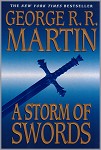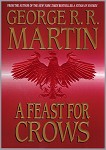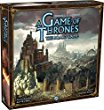|
One thing years of role playing has taught us is that no matter what style of play we each enjoy, regulation is inversely proportional to fun. The more rules there are, the less fun people seem to have, largely because memorizing and enforcing rules is the last thing that anyone wants to do in their free time.
So with that in mind, we're happy to tell you that there's just one rule in A Game of Thrones, and that is to remain in character at all times; Something we tend to think of as the "ONE rule" because everything else naturally falls into place when players obey this rule. As a consequence, we need not draw up a litany of do's and don'ts for you to memorize and for DMs and administrators to enforce.
Stay in character. It's that simple.
Also, checkout the downloads section to make sure you have everything you need to play.
Point Buy System
A point buy system is used to determine ability scores during character creation. The system is based on points rather than random dice rolls, and is intended to produce a fair and balanced play environment, something BioWare considered very important for a multiplayer game of this nature.
A character starts with an ability score of 8 in each of his six abilities, and then draws upon a pool of 30 points to raise these abilities. (An exception is made for characters that can cast spells, though, as described later.) Initially, the cost to increment (raise by 1) a score is 1 point. However, as an ability score is raised above 14, it becomes more expensive to raise it further; it costs 2 points to increment a score to 15 or 16, and 3 points to increment it to 17 or 18.
| Table: Point Buy Costs |
|
| Bought ability score |
8 |
9 |
10 |
11 |
12 |
13 |
14 |
15 |
16 |
17 |
18 |
| Incremental cost |
0 |
1 |
1 |
1 |
1 |
1 |
1 |
2 |
2 |
3 |
3 |
| Cumulative cost |
0 |
1 |
2 |
3 |
4 |
5 |
6 |
8 |
10 |
13 |
16 |
|
There is a danger in trying to make too many scores "exceptional", as the increased costs can leave insufficient points to get acceptable scores in the other abilities. For example, starting with one ability score at 18 and one at 17 (which cost 16 and 13 points, respectively) leaves but a single point to spend on the remaining four abilities.
A uniform distribution of the 30 points among the six abilities results in a score of 13 for each ability. However, since even scores are often preferable to odd, this is more of a baseline for those planning a character's ability distribution than something to actually use. For those willing (or desiring) to "dump" one ability, another convenient baseline is that a uniform distribution among five abilities results in five ability scores of 14 and one of 8.
Racial modifiers are added after the points are spent. So, for example, an elf spending 13 points on dexterity would have a starting dexterity score of 8 + 9 (point buy) + 2 (racial modifier) = 19.
|
|
There are four playable races to choose from in A Game of Thrones, though the Human is by far the most common creature in Westeros. The other races are extraordinarily unusual or largely mythical creatures that generally do not fit into the fabric of Westerosi society. - Human
Humans in Westeros are often larger than would be expected from a roughly medieval civilization. Many men are over six feet tall, with abnormally large men standing seven feet or taller. Some bloodlines of humans are known for having unusual physical traits. Targaryens often have platinum hair and violet eyes, while descendants of the Ghiscari often have both red and black hair. Natives of Westeros have predominantly European features, with regional variations. Natives of the Summer Islands and the continent of Sothoryos have predominantly African features. Natives of other areas have a variety of features from many real-world races. - Giant*
Huge, shaggy humanoids of slightly below human intelligence, Giants are a dwindling species found only in the lands to the extreme north, beyond the Wall. They ride mammoths into battle, wielding crude clubs that are little more than logs. They speak the Old Tongue of the First Men. - Children of the Forest*
The original inhabitants of Westeros, Children of the Forest are frequently mentioned but have not been seen in thousands of years. They are thought to be diminutive humanoid creatures; dark and beautiful, with mysterious powers over dreams and nature. They are said to have used obsidian weapons and weirbows in battle. Little of their legacy exists at present beyond their worship of nameless nature gods still practiced by some in the North, and the remaining Weirwoods. - Others*
A mysterious and apparently malevolent race of creatures found beyond the Wall. They have only been seen at night and seem to bring unnatural cold with them. They appear as tall, gaunt humanoids with eyes of blue so deep it burns like fire. They wear armor that shifts in color with every step, and wield thin crystal swords that are so cold they can shatter iron. Others move silently, but their voices sound like cracking ice. Creatures they kill reanimate as wights, undead zombies with glowing blue eyes. The Others exhibit a weakness to weapons made of dragonglass, which will pierce their armor easily. In death, they seem to melt into a pool of extremely cold liquid.
* Requires approval. |
|
There are eight core classes and eight prestige classes.
Core Classes
- Artisan
Craftsmen, performers, diplomats, heralds, and stewards are all Artisans. They each use their specialised skills to make their way in the world
- Godsworn
Priests and followers of the Faith, the Godsworn are the loyal servants of the Seven.
- Hunter
Men and women of the wilderness, Hunters learn to bring down their prey through stealth and lore.
- Knave
Some use stealth and guile; others rely on brute force and fear. All Knaves seek to take whatever they desire, whether bread for their suppers or gold for their pockets.
- Maester
These “knights of the mind” are masters of as many types of lore as are known in the world.
- Man-at-Arms
Men-at-arms may be loyal bannermen or sellswords from foreign lands, but at heart, all are soldiers and warriors who survive and thrive by their strength and prowess.
- Noble
Nobles are the children of high birth from the great and small houses of nobility. They have wealth, education, and infl uence — every conceivable advantage over the smallfolk beneath them — as well as their own share of responsibilities and enemies.
- Raider
Barbarians and wild folk from the fringes of settled lands, Raiders are unruly and loyal only to their own. They may call themselves lords, tribesmen, or simply “free.”
Prestige Classes
- Bloodrider
Horselords and bodyguards of the Dothraki khals, united by a bond stronger than words or honour. They are blood of his blood in name, thought, and deed.
- Brother of the Kingsguard
The seven Brothers of the Kingsguard are sworn to protect the king and the royal family from harm. They are the king’s sword and shield, ostensibly drawn from the land’s greatest Knights.
- Commander
Soldiers and martial lords aspire to lead great armies and rule the battlefield. The Commander is a specialised warrior, trained to master strategy and logistics.
- Drowned Man
Drowned Men are the clergymen of the Drowned God, the old God of the Ironborn. All Drowned Men are drowned and brought back to life during their initiation into the priesthood.
- Knight
The embodiment of chivalry and valour, Knights are martial men, sworn in the Faith of the Seven. While rare in the North, they are what southron boys dream of becoming, and southron girls dream of marrying.
- Night's Watch Ranger
A brother of the Night’s Watch, the Rangers are the first line of defence. They traverse the wild lands north of the Wall, bringing battle to the wildlings and greater threats.
- Night's Watch Steward
A brother of the Night’s Watch, the Stewards are the caretakers, majordomos, tutors, and scholars of the Night’s Watch. They keep the Watch’s history, maintain the domestic arts, and in some cases, squire or apprentice to the high officers.
- Red Priest of R'hllor
Clergy of the R'hllor religion are called 'red priests,' due to the loose, crimson robes they wear. Very few are known to exist in Westeros.
- Spy
In Westeros, where sword and shield rule, Spies are seen as loathsome, cowardly, and weak. Of course, by dismissing them, Spies — whether ladies, lords, or eunuchs — become invisible, and their infl uence can raise and shatter great lords in the game of thrones.
- Water Dancer
The best of the Bravos — perhaps one in a hundred, perhaps less — learn the water dance, a style of fighting that relies on speed, finesse, and perception. They are artists as much as soldiers, and hone their craft as an art.
- Shadowbinder of Asshai, Spellsinger of Valyria
TBD
|
|
|
|
|






















